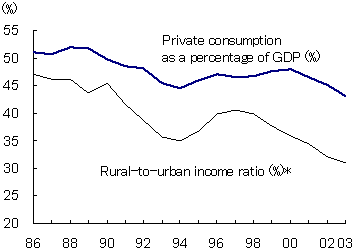The growth of fixed asset investment is slowing down in China as the impact of monetary tightening policy put in place in the second half of last year has become apparent. Optimists are hoping that private consumption will serve as a new engine for the Chinese economy, taking over that role from investment. Unfortunately, however, no favorable factors for boosting consumption, whether cyclical or structural, are in sight.
The economic slowdown will lead to deceleration in wage growth and a rise in unemployment. With real interest rates on bank deposits rates remaining negative amid rising inflation, and the stock market slumping, private financial assets are shrinking in value. Furthermore, the hitherto booming real estate market now seems to be entering a phase of adjustment in which homeowners struggle to repay mortgages on property purchased at boom prices and consumer confidence is eroding. Reflecting these macroeconomic uncertainties, China's consumer confidence index fell 5.3 points from the previous quarter to 90.1 in the second quarter of 2004, according to the National Bureau of Statistics of China. In addition, both the consumer satisfaction index, an indicator of the degree of satisfaction with the current state of economy, and the forecast index for the next several months, have declined.
Furthermore, the domestic automotive market, which had so far been a major force supporting private consumption, is losing steam. According to statistics released by the China Association of Automobile Manufacturers, automobile sales in China totaled 167,300 units in June 2004, down 5.8 percent from the preceding month, the third consecutive monthly fall since sales peaked at 226,300 units in March. Meanwhile, vehicle output in June totaled 215,600 units, up 2.5 percent from May, resulting in a sharp rise in inventory, with production far exceeding sales.
In addition to cyclical factors, several structural problems of China have also put a damper on consumption. As China advances toward a full-fledged market economy, people can no longer rely upon state-owned enterprises or People's Communes to provide social security, but no substitute system is yet in place. Thus, people have no other choice but to provide for themselves by cutting back on consumption and saving for possible unemployment, sickness, and post-retirement life. Another brake on consumption is the widening income disparities in China. While consumption of luxury goods by a small number of rich households has been surging, income growth among farmers - still the majority of the Chinese population - has stagnated, leading to lackluster growth in overall consumption.
In fact, the share of private consumption in China's gross domestic product (GDP) has been declining in tandem with the rise in income disparity between the urban and rural populations ( figure ). In 2003, private consumption accounted for 43.2 percent of China's GDP. This share is not only far below the 60 percent average of industrialized countries including Japan, it is the lowest in Asia. A lower propensity to consume means both the direct impact as well as the indirect impact through the multiplier effect (whereby rising income induced by rising of rising consumption) on economic growth is relatively small.
To achieve sustainable growth, the adminstration of President Hu Jintao and Premier Wen Jiabao has adopted a new "Scientific Development Philosophy," which moves away from the previous administrations' focus on efficiency toward greater emphasis on expanding domestic demand by narrowing income gaps between rural and urban areas, and between inland and coastal areas. However, it will be a long time before this new policy produces results; a range of tasks remains. Specifically, the household registration system must be reformed to increase labor mobility; conditions for investment, especially in underdeveloped areas, must be improved; and a social security system covering the whole population, including farmers, must be established. In addition, further redistribution of national income via the central government to local governments in backward areas is indispensable. Only after all these tasks are completed, will China be able to shift from investment- to consumption-led growth.

*Per capita disposable income and per capita net income are used to measure urban ad rural income, respectively.
(Source)China Statistical Abstract 2004


